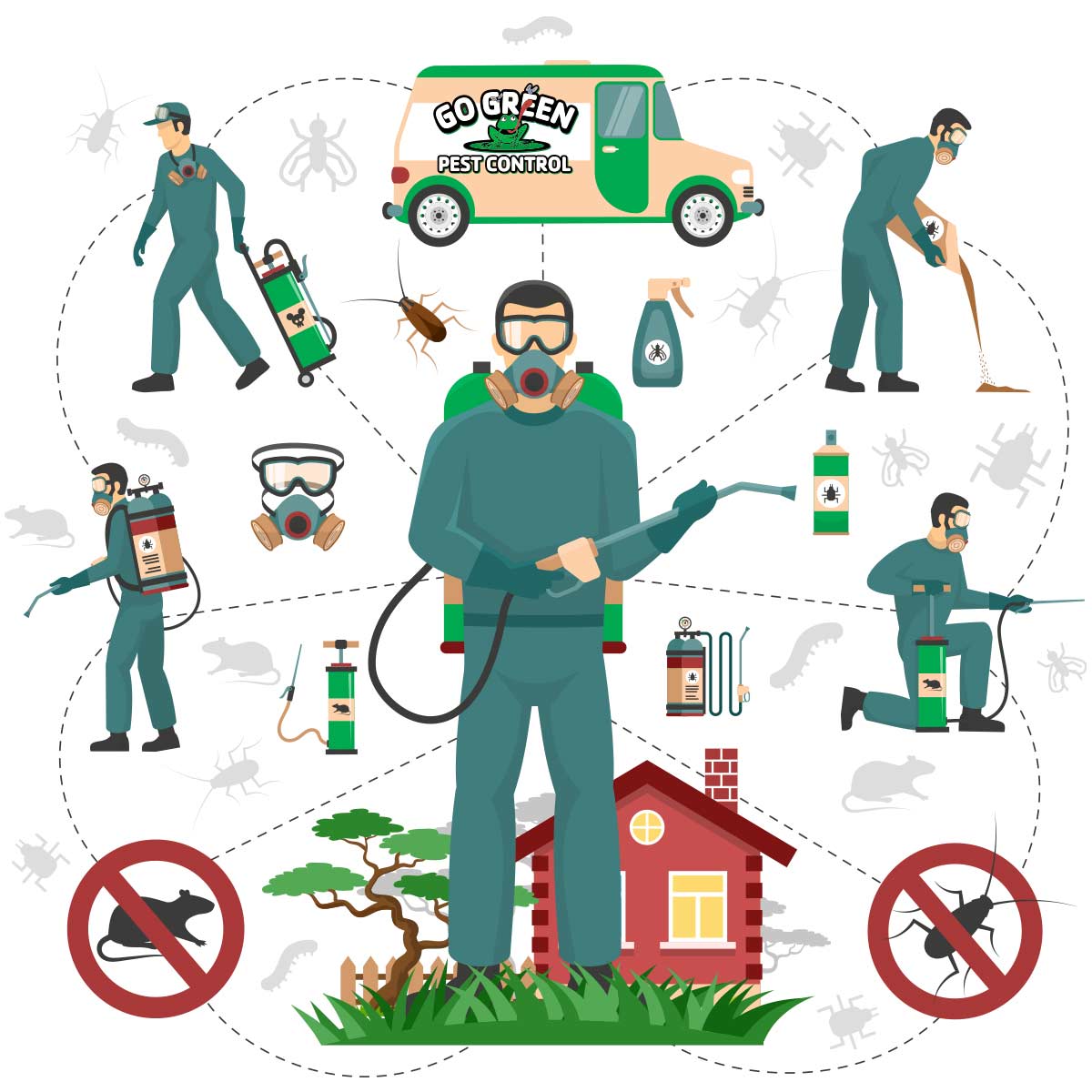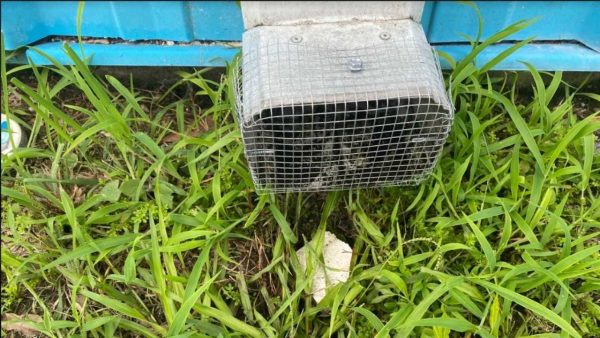How an Exterminator in Port Charlotte Can Safeguard Your House from Pests
Discover the Significance of Insect Control in Preserving a Healthy Atmosphere and Treatment Strategies

The Function of Bugs in Ecological Communities
Pests, typically watched entirely as problems, play a multifaceted role in communities that is important for preserving ecological balance. They contribute significantly to various environmental processes, consisting of pollination, nutrition cycling, and parasite control. Lots of insect types, such as and butterflies, are essential pollinators for a large array of plants, which in turn sustains biodiversity and food production.
Additionally, pests work as prey for various predators, creating an essential link in food internet. This interdependence makes certain the survival of numerous varieties and assists regulate populaces within ecological communities (Termite treatment Port Charlotte). In addition, decomposer parasites, such as particular beetles and fungi, contribute in breaking down raw material, hence enriching dirt and assisting in nutrition recycling.
On the other hand, while parasites can be beneficial, their overpopulation or intrusion into non-native settings might interrupt these environmental functions. This intricacy emphasizes the importance of comprehending insect characteristics, as effective insect management methods must consider both their environmental functions and potential influence on human tasks. Balancing pest presence while minimizing injury is vital for protecting the stability of communities and ensuring farming productivity.
Health Threats Connected With Parasites
The existence of parasites in various settings expands past their environmental duties, as they additionally position significant health threats to human beings and animals. Lots of pests, including bloodsuckers, rodents, and insects, are carriers of conditions that can have severe health and wellness implications. Rats are understood to send hantavirus and leptospirosis, both of which can lead to extreme respiratory system and renal issues, specifically.
Insects such as mosquitoes and ticks are infamous for spreading out vector-borne illness like malaria, dengue high temperature, and Lyme condition. These illnesses can cause high morbidity and death rates, specifically in at risk populaces. In addition, insects like insects and cockroaches can exacerbate allergic reactions and bronchial asthma, adding to respiratory problems in people, especially those with pre-existing problems.
Moreover, the visibility of parasites can cause mental anxiety and pain, influencing overall health. Contamination of food and surfaces by bug droppings and stays can bring about foodborne illnesses, highlighting the relevance of keeping sanitary conditions. Consequently, comprehending the health and wellness risks connected with pests is crucial in acknowledging the requirement of efficient parasite monitoring techniques to protect animal and human health.

Advantages of Reliable Pest Control
Efficient bug control is essential for maintaining a healthy and balanced and safe environment, as it continually reduces the various dangers associated with bug problems. Among the main advantages of effective parasite management is the decrease of wellness dangers. Pests such as rats, insects, and roaches are vectors for conditions that can influence both animals and people. By managing these populations, the likelihood of illness transmission is considerably lowered.
Furthermore, effective bug control safeguards residential property and structures from damage. Several insects, like termites and woodworker ants, can cause extensive structural damage that may call for pricey repair services. By proactively handling these companies, varmint control home owners and problems can protect their financial investments.
One more substantial benefit is the improvement of general high quality of life. A pest-free setting contributes to psychological wellness and minimizes stress and anxiety associated with invasions. Effective insect control cultivates a more secure environment for pet dogs and children, guaranteeing that homes continue to be sanctuaries free from disease-causing microorganisms and unsafe chemicals.
Common Pest Control Techniques

In the realm of insect administration, different strategies are employed to battle invasions properly. These techniques can be extensively categorized right into three primary approaches: cultural, mechanical, and chemical controls.
Cultural control includes changing practices to lower bug survival, recreation, and facility. This may consist of plant rotation, proper sanitation, and environment manipulation, which jointly produce a setting much less favorable to pest proliferation.
Mechanical control uses physical techniques to get rid of parasites (Termite treatment Port Charlotte). Strategies such as vacuum cleaners, barriers, and catches are frequently used to straight remove insects from a location. This approach is especially reliable for managing rodents and insects without making use of unsafe chemicals
Chemical control includes the application of pesticides to take care of bugs. These compounds can be classified right into insecticides, herbicides, and fungicides, each targeting details sorts of bugs. It is vital to make use of these chemicals carefully, adhering to safety standards and laws to reduce prospective injury to non-target types and the environment.
Each insect control technique has its benefits and limitations, and typically, an integrated strategy combining multiple techniques yields the very best cause maintaining a pest-free environment.
Lasting Insect Management Practices
Sustainable insect administration methods include a variety of methods created to minimize ecological influence while effectively managing parasite populations. These methods focus on the usage of environmentally friendly methods over chemical pesticides, consequently lowering the danger how to control pests in your home of damage to non-target species, including helpful insects, wild animals, and people.
Integrated Insect Monitoring (IPM) is a cornerstone of lasting techniques, combining organic, cultural, mechanical, and chemical techniques to handle pests. Biological control entails introducing natural killers or bloodsuckers to subdue insect populations. Social techniques, such as plant turning and polyculture, interrupt pest life cycles and enhance community strength.
Mechanical methods, such as barriers or traps, can properly stop insect gain access to without chemical treatment. Additionally, preserving healthy communities via proper dirt monitoring, plant health, and biodiversity can normally alleviate parasite issues.
Education and learning and recognition are essential components, encouraging individuals and areas to identify insect hazards early and implement safety nets. Termite treatment Port Charlotte. By promoting an all natural technique that stabilizes parasite control with eco-friendly honesty, sustainable pest administration practices not only safeguard plants and structures yet also add to a healthier environment for future generations
Verdict

Recognizing the wellness threats connected with bugs is vital in acknowledging the necessity of effective pest monitoring techniques to guard human and animal health and wellness.
Efficient insect control is crucial for maintaining a healthy and safe environment, as it consistently reduces the many threats connected with pest problems.Integrated Parasite Management (IPM) is a keystone of lasting practices, incorporating organic, cultural, mechanical, and chemical tactics to handle pests. By comprehending the function of parasites, identifying involved health and wellness threats, and employing varied treatment techniques, a sustainable technique to pest management can be accomplished. Integrated Parasite Management (IPM) emphasizes a holistic approach that reduces harm to useful microorganisms while successfully managing parasite populaces.